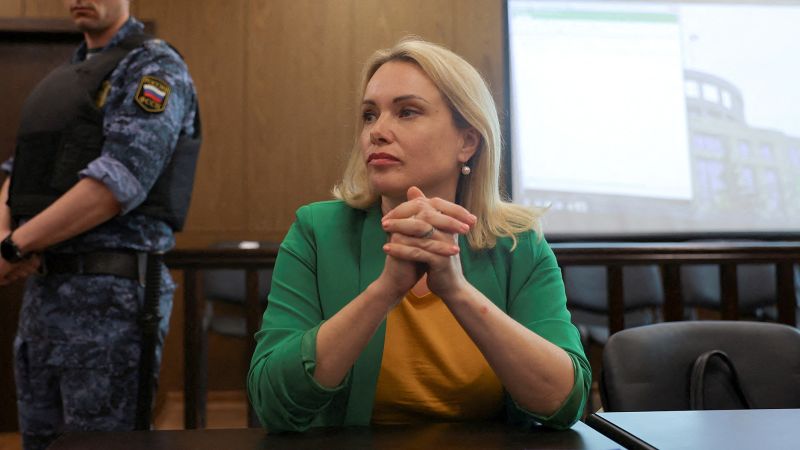Russian journalist who protested live on TV escapes house arrest
CNN
—
Marina Ovsyannikova, a Russian journalist who staged a bold protest live on state television, was declared a fugitive after she fled, Russian media reported.
Ovsyannikova was placed under house arrest in August. She had been accused of spreading false information about the Russian military after taking part in a protest in July, according to Russian news agency TASS. His detention was to last until Sunday.
Ovsyannikova’s ex-husband said she escaped house arrest with her daughter on Saturday, TASS reported. His lawyer, Dmitry Zakhvatov, said he could not confirm those allegations.
“All I know is that she’s gone,” Zakhvatov told CNN.
Ovsyannikova has been added to the Russian Interior Ministry’s “wanted list”, TASS reported on Monday.
The 44-year-old journalist rose to international fame in March when, as editor-in-chief of Russian TV channel Channel One, she stood behind an anchor and held up a sign that read ‘No war’ during a a live broadcast.
The Kremlin called his actions “hooliganism”, a criminal offense in Russia. Following her protest, Ovsyannikova was arrested, interrogated for over 14 hours, released and fined 30,000 rubles (about $500).
A Moscow court found her guilty of organizing an “unauthorized public event” and she fled Russia, but returned in July, according to her official Facebook page.
Ovsyannikova was later fined 50,000 rubles (about $820) for a video recorded July 13 in which she spoke out against the dispute.
She also shared content of herself organizing a one-woman anti-war protest on an embankment opposite the Kremlin in Moscow on July 15.
The on-air protest was particularly risky for Ovsyannikova, as it came amid an increased crackdown on both political dissent and press freedom, forcing local Russian media to reduce their coverage of the invasion or to shut down completely. International news networks, including CNN, temporarily suspended broadcasting from Russia in the days following the invasion.
Ovsyannikova said she was “ashamed” of her job at Channel One, which she said was effectively peddling Kremlin propaganda. But after the invasion she said she felt it was “impossible to remain silent” and wanted the world to know that many did not agree with the war.
“The decision had been brewing for a long time,” she told CNN’s Christiane Amanpour shortly after the initial protest. “The war was the point of no return, when it was simply impossible to remain silent.”
Speaking to CNN from Germany in May, where she worked as a correspondent for Die Welt newspaper, Ovsyannikova said she was the victim of online harassment, intimidation and attempts to discredit her, including from Ukrainians who disapproved of a former Russian propagandist covering the conflict. .
— David Goldman and Joshua Berlinger contributed to this report.


Comments are closed.